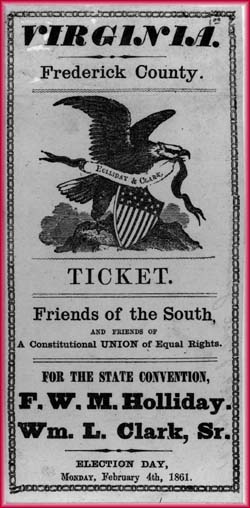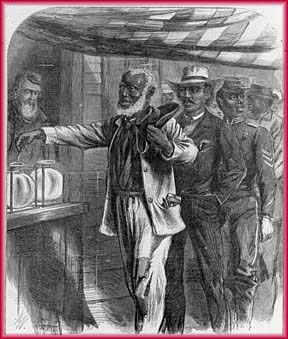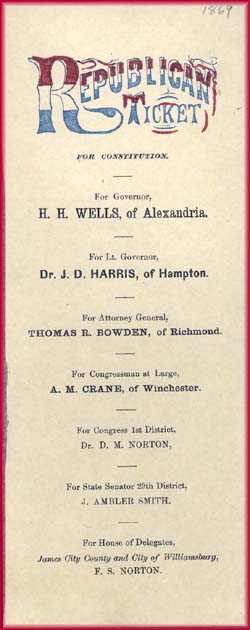|
|
|
|
| |
|
Colonial
Virginia |
American Revolution |
Democratizing the Old Dominion
Twentieth Century | Virginia
Political Leaders |
|
Civil War and Reconstruction |
 |
The Civil War brought about
radical change. The Fifteenth Amendment to the United States
Constitution enfranchised African American men for the first
time, and following the election of African Americans to the
state Constitutional Convention of 1867-1868, Virginians
adopted a new constitution that once again changed political
practices in the state. |
On
4 February 1861 Virginians voted for members of the convention
that in April adopted the Ordinance of Secession.
Frederick County ballot. 1861. Library of Virginia |
|
| Among the most important changes
were the creation of a new public school system and a
reorganization of the local government structure to enable a
larger number of elected citizens to participate in governing
the counties, towns, and cities of Virginia. Many of these
changes were unpopular with Virginia's traditional political
leaders, and during the closing years of the nineteenth century
they attempted to turn back the clock and to drive African
Americans and the Republican Party out of politics. They
succeeded with the constitution of 1902, which imposed strict
and complicated voter registration procedures designed to reduce
or eliminate African American men from political life and also
to limit the number of poor and uneducated white men who could
take part. |

|
|
The First Vote.
Alfred R. Waud. Harper's Weekly,
16 November 1867. The man on the left conducting the election
may be Lipscomb. Woodcut engraving. The Library of Virginia. |
 |
During the early years of the
twentieth century, the black voting rolls fell from about
147,000 to fewer than 10,000, and both African Americans and
Republicans had few opportunities to have a direct impact on
Virginia politics. |
|
1869 Republican Party election
ticket.
Library of Virginia
Broadside 1869 793. |
|
|
| Civil
War and Reconstruction Political Leaders |
|
|
|
|